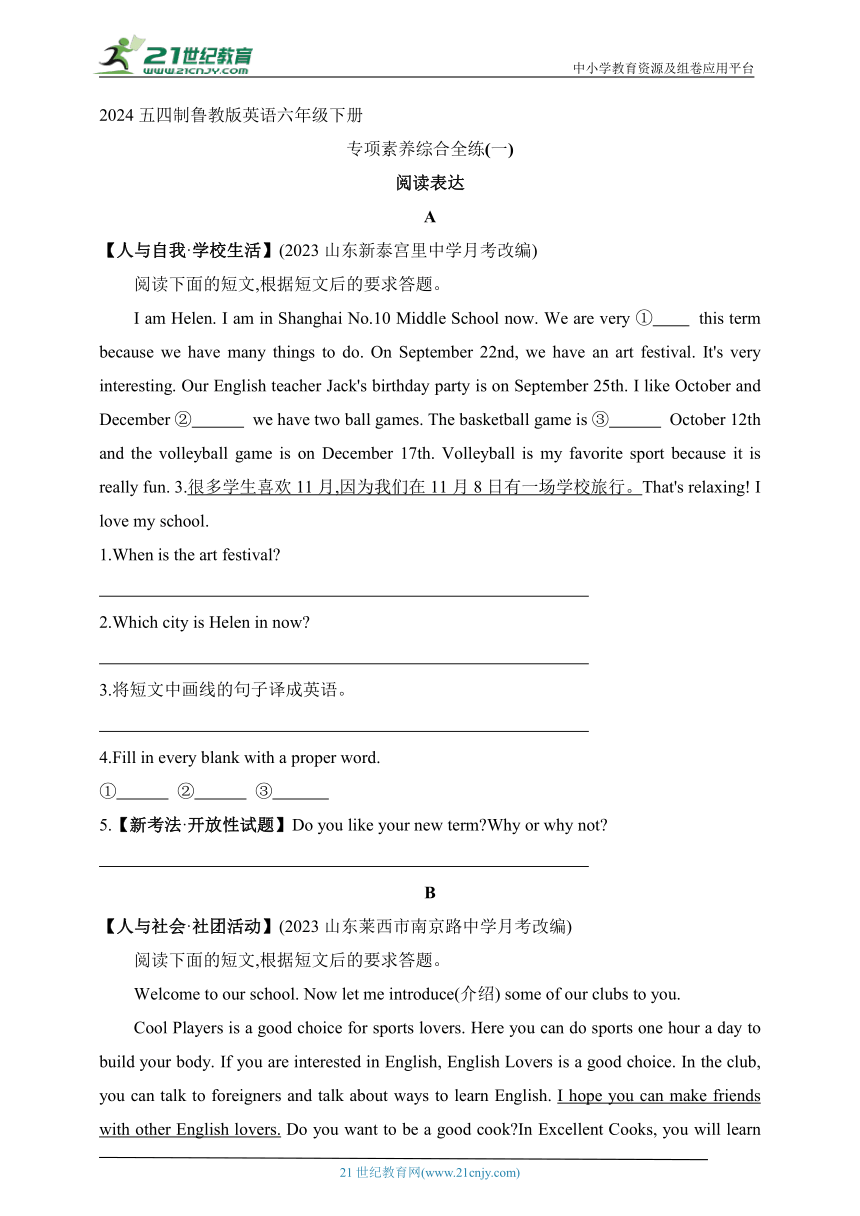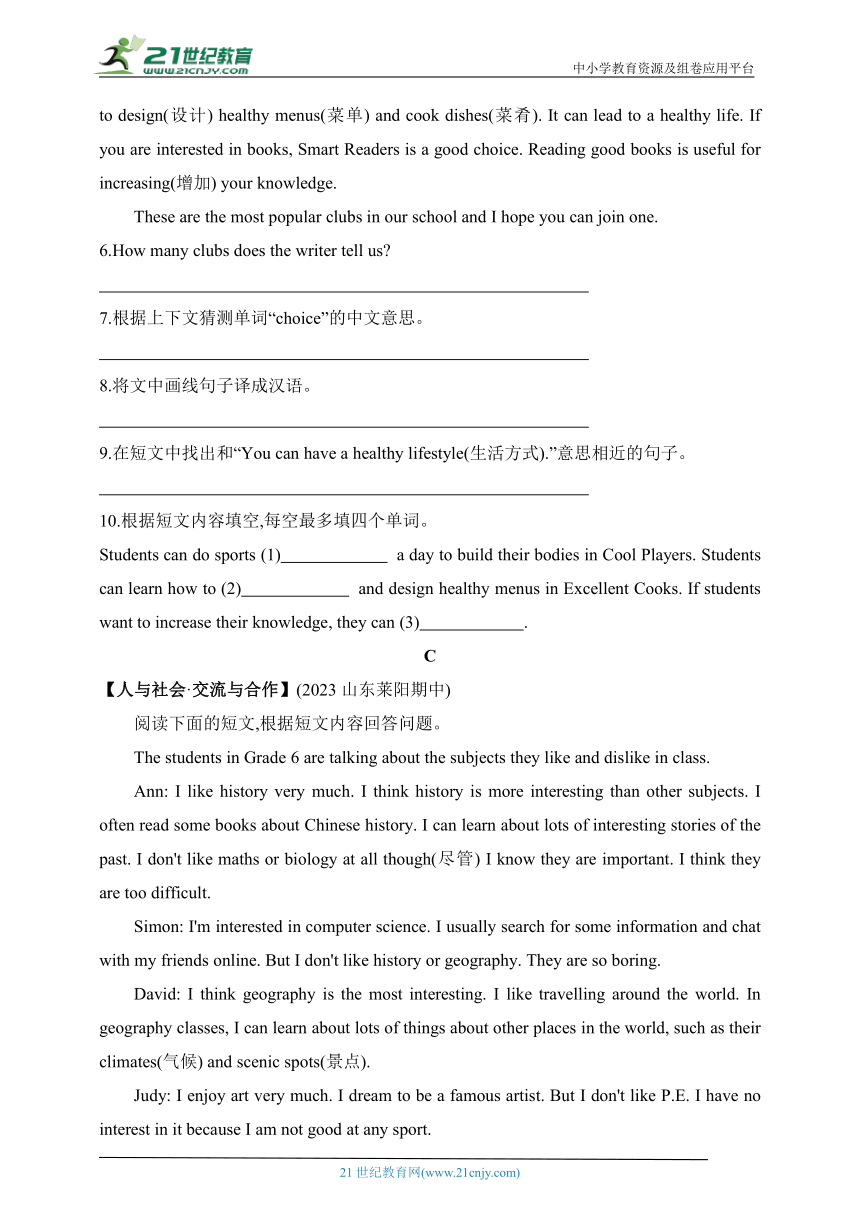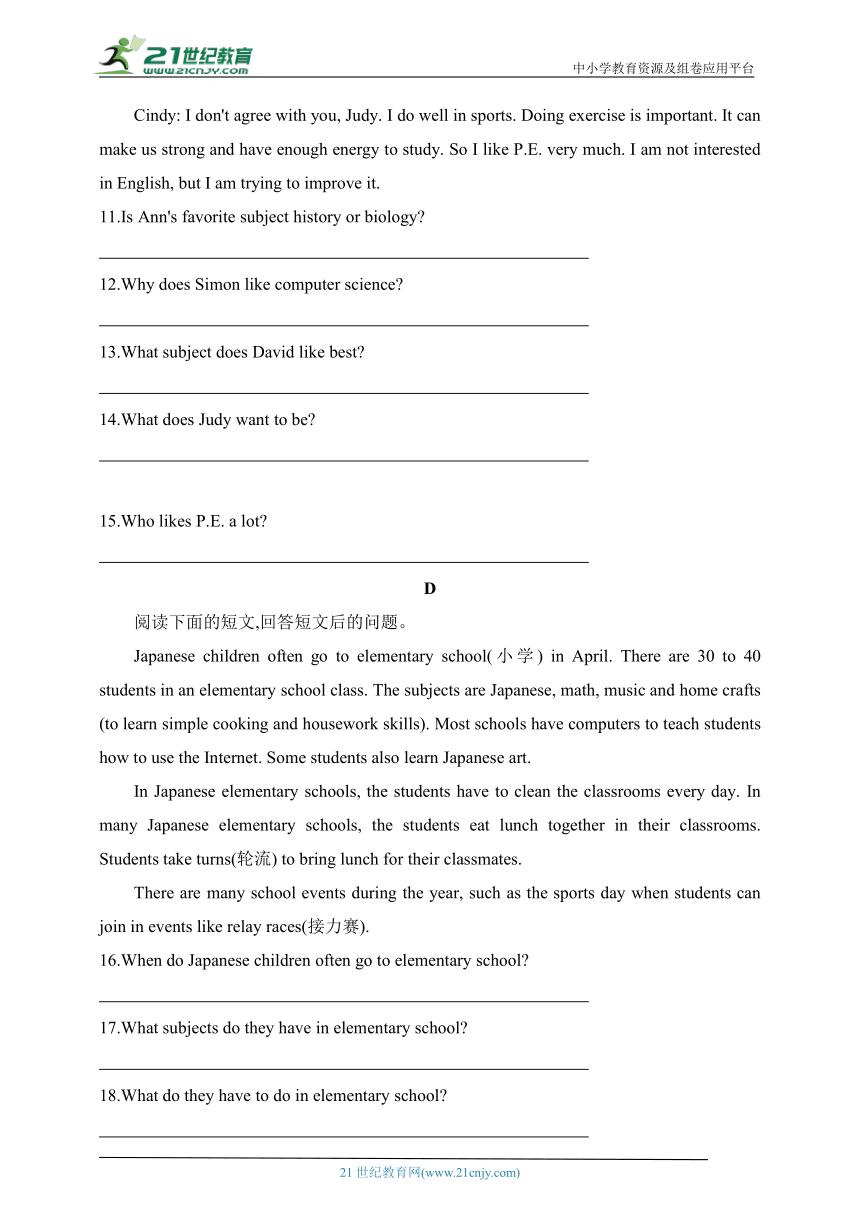2024五四制鲁教版英语六年级下册--专项素养综合全练(一)阅读表达(含解析)
文档属性
| 名称 | 2024五四制鲁教版英语六年级下册--专项素养综合全练(一)阅读表达(含解析) |  | |
| 格式 | docx | ||
| 文件大小 | 280.5KB | ||
| 资源类型 | 试卷 | ||
| 版本资源 | 鲁教版 | ||
| 科目 | 英语 | ||
| 更新时间 | 2024-01-03 19:47:57 | ||
图片预览



文档简介
中小学教育资源及组卷应用平台
2024五四制鲁教版英语六年级下册
专项素养综合全练(一)
阅读表达
A
【人与自我·学校生活】(2023山东新泰宫里中学月考改编)
阅读下面的短文,根据短文后的要求答题。
I am Helen. I am in Shanghai No.10 Middle School now. We are very ① this term because we have many things to do. On September 22nd, we have an art festival. It's very interesting. Our English teacher Jack's birthday party is on September 25th. I like October and December ② we have two ball games. The basketball game is ③ October 12th and the volleyball game is on December 17th. Volleyball is my favorite sport because it is really fun. 3.很多学生喜欢11月,因为我们在11月8日有一场学校旅行。That's relaxing! I love my school.
1.When is the art festival
2.Which city is Helen in now
3.将短文中画线的句子译成英语。
4.Fill in every blank with a proper word.
① ② ③
5.【新考法·开放性试题】Do you like your new term Why or why not
B
【人与社会·社团活动】(2023山东莱西市南京路中学月考改编)
阅读下面的短文,根据短文后的要求答题。
Welcome to our school. Now let me introduce(介绍) some of our clubs to you.
Cool Players is a good choice for sports lovers. Here you can do sports one hour a day to build your body. If you are interested in English, English Lovers is a good choice. In the club, you can talk to foreigners and talk about ways to learn English. I hope you can make friends with other English lovers. Do you want to be a good cook In Excellent Cooks, you will learn to design(设计) healthy menus(菜单) and cook dishes(菜肴). It can lead to a healthy life. If you are interested in books, Smart Readers is a good choice. Reading good books is useful for increasing(增加) your knowledge.
These are the most popular clubs in our school and I hope you can join one.
6.How many clubs does the writer tell us
7.根据上下文猜测单词“choice”的中文意思。
8.将文中画线句子译成汉语。
9.在短文中找出和“You can have a healthy lifestyle(生活方式).”意思相近的句子。
10.根据短文内容填空,每空最多填四个单词。
Students can do sports (1) a day to build their bodies in Cool Players. Students can learn how to (2) and design healthy menus in Excellent Cooks. If students want to increase their knowledge, they can (3) .
C
【人与社会·交流与合作】(2023山东莱阳期中)
阅读下面的短文,根据短文内容回答问题。
The students in Grade 6 are talking about the subjects they like and dislike in class.
Ann: I like history very much. I think history is more interesting than other subjects. I often read some books about Chinese history. I can learn about lots of interesting stories of the past. I don't like maths or biology at all though(尽管) I know they are important. I think they are too difficult.
Simon: I'm interested in computer science. I usually search for some information and chat with my friends online. But I don't like history or geography. They are so boring.
David: I think geography is the most interesting. I like travelling around the world. In geography classes, I can learn about lots of things about other places in the world, such as their climates(气候) and scenic spots(景点).
Judy: I enjoy art very much. I dream to be a famous artist. But I don't like P.E. I have no interest in it because I am not good at any sport.
Cindy: I don't agree with you, Judy. I do well in sports. Doing exercise is important. It can make us strong and have enough energy to study. So I like P.E. very much. I am not interested in English, but I am trying to improve it.
11.Is Ann's favorite subject history or biology
12.Why does Simon like computer science
13.What subject does David like best
14.What does Judy want to be
15.Who likes P.E. a lot
D
阅读下面的短文,回答短文后的问题。
Japanese children often go to elementary school(小学) in April. There are 30 to 40 students in an elementary school class. The subjects are Japanese, math, music and home crafts (to learn simple cooking and housework skills). Most schools have computers to teach students how to use the Internet. Some students also learn Japanese art.
In Japanese elementary schools, the students have to clean the classrooms every day. In many Japanese elementary schools, the students eat lunch together in their classrooms. Students take turns(轮流) to bring lunch for their classmates.
There are many school events during the year, such as the sports day when students can join in events like relay races(接力赛).
16.When do Japanese children often go to elementary school
17.What subjects do they have in elementary school
18.What do they have to do in elementary school
19.Where do they have lunch
20.How many students are there in an elementary school class in Japan
答案全解全析
A
[语篇解读] 本文主要介绍了Helen这学期的一些学校活动。
1.On September 22nd. 由文中句子“On September 22nd, we have an art festival.”可知答案。
2.Shanghai. 由文中句子“I am in Shanghai No.10 Middle School now.”可知答案。
3.Many students like November because we have a school trip on November 8th.
4.①busy 由设空处后的“because we have many things to do”可知,此处应表示“我们这学期很忙”。故填busy。
②because 由语境可知,设空处前后内容是因果关系,故用because引导原因状语从句。
③on 表示在具体的某一天用介词on。
5.Yes, I do. We have many fun activities.(开放性试题,言之有理即可)
B
[语篇解读] 本文主要介绍了四个俱乐部。
6.4/Four. 本文共介绍了“Cool Players”、“English Lovers”、“Excellent Cooks”和“Smart Readers”四个俱乐部。
7.选择 根据第二段中的“Cool Players is a good choice for sports lovers.”可猜测,该俱乐部对运动爱好者而言是个好选择。choice的意思是“选择”。
8.我希望你可以和其他英语爱好者交朋友。
9.It can lead to a healthy life. “You can have a healthy lifestyle.”的意思是“你可以有一种健康的生活方式”,与“It can lead to a healthy life.”意思相近。
10.(1)one hour 根据第二段中的“Here you can do sports one hour a day to build your body.”可知答案。
(2)cook dishes 根据第二段中的“In Excellent Cooks...cook dishes.”可知答案。
(3)read good books 根据第二段中的“Reading good books is useful for increasing your knowledge.”可知答案。
C
[语篇解读] 本文主要介绍了六年级的学生们喜欢和不喜欢的课程。
11.History. 由第二段中的“I think history is more interesting than other subjects.”可知,安最喜欢历史。
12.Because he can find some information and chat with his friends on the Internet. 由第三段中的“I usually search for some information and chat with my friends online.”可知,西蒙喜欢计算机这个学科是因为他可以在网上找到一些信息并和朋友们聊天。
13.Geography. 由第四段中的“I think geography is the most interesting.”可知,大卫最喜欢地理。
14.A famous artist. 由第五段中的“I dream to be a famous artist.”可知,朱迪想成为一个著名的艺术家。由此可知答案。
15.Cindy. 由第六段中的“So I like P.E. very much.”可知,辛迪很喜欢体育。
D
[语篇解读] 本文主要介绍了日本小学的一些基本情况。
16.They often go to elementary school in April. 由第一段中的“Japanese children often go to elementary school in April.”可知,日本的孩子经常在四月份去上小学。
17.Japanese, math, music and home crafts. 由第一段中的“The subjects are Japanese, math, music and home crafts...”可知答案。
18.They have to clean the classrooms every day. 由第二段中的“In Japanese elementary schools, the students have to clean the classrooms every day.”可知答案。
19.In their classrooms. 由第二段中的“In many Japanese elementary schools, the students eat lunch together in their classrooms.”可知,日本学生们在教室吃午饭。
20.There are 30 to 40 students. 由第一段中的“There are 30 to 40 students in an elementary school class.”可知答案。
21世纪教育网 www.21cnjy.com 精品试卷·第 2 页 (共 2 页)
21世纪教育网(www.21cnjy.com)
2024五四制鲁教版英语六年级下册
专项素养综合全练(一)
阅读表达
A
【人与自我·学校生活】(2023山东新泰宫里中学月考改编)
阅读下面的短文,根据短文后的要求答题。
I am Helen. I am in Shanghai No.10 Middle School now. We are very ① this term because we have many things to do. On September 22nd, we have an art festival. It's very interesting. Our English teacher Jack's birthday party is on September 25th. I like October and December ② we have two ball games. The basketball game is ③ October 12th and the volleyball game is on December 17th. Volleyball is my favorite sport because it is really fun. 3.很多学生喜欢11月,因为我们在11月8日有一场学校旅行。That's relaxing! I love my school.
1.When is the art festival
2.Which city is Helen in now
3.将短文中画线的句子译成英语。
4.Fill in every blank with a proper word.
① ② ③
5.【新考法·开放性试题】Do you like your new term Why or why not
B
【人与社会·社团活动】(2023山东莱西市南京路中学月考改编)
阅读下面的短文,根据短文后的要求答题。
Welcome to our school. Now let me introduce(介绍) some of our clubs to you.
Cool Players is a good choice for sports lovers. Here you can do sports one hour a day to build your body. If you are interested in English, English Lovers is a good choice. In the club, you can talk to foreigners and talk about ways to learn English. I hope you can make friends with other English lovers. Do you want to be a good cook In Excellent Cooks, you will learn to design(设计) healthy menus(菜单) and cook dishes(菜肴). It can lead to a healthy life. If you are interested in books, Smart Readers is a good choice. Reading good books is useful for increasing(增加) your knowledge.
These are the most popular clubs in our school and I hope you can join one.
6.How many clubs does the writer tell us
7.根据上下文猜测单词“choice”的中文意思。
8.将文中画线句子译成汉语。
9.在短文中找出和“You can have a healthy lifestyle(生活方式).”意思相近的句子。
10.根据短文内容填空,每空最多填四个单词。
Students can do sports (1) a day to build their bodies in Cool Players. Students can learn how to (2) and design healthy menus in Excellent Cooks. If students want to increase their knowledge, they can (3) .
C
【人与社会·交流与合作】(2023山东莱阳期中)
阅读下面的短文,根据短文内容回答问题。
The students in Grade 6 are talking about the subjects they like and dislike in class.
Ann: I like history very much. I think history is more interesting than other subjects. I often read some books about Chinese history. I can learn about lots of interesting stories of the past. I don't like maths or biology at all though(尽管) I know they are important. I think they are too difficult.
Simon: I'm interested in computer science. I usually search for some information and chat with my friends online. But I don't like history or geography. They are so boring.
David: I think geography is the most interesting. I like travelling around the world. In geography classes, I can learn about lots of things about other places in the world, such as their climates(气候) and scenic spots(景点).
Judy: I enjoy art very much. I dream to be a famous artist. But I don't like P.E. I have no interest in it because I am not good at any sport.
Cindy: I don't agree with you, Judy. I do well in sports. Doing exercise is important. It can make us strong and have enough energy to study. So I like P.E. very much. I am not interested in English, but I am trying to improve it.
11.Is Ann's favorite subject history or biology
12.Why does Simon like computer science
13.What subject does David like best
14.What does Judy want to be
15.Who likes P.E. a lot
D
阅读下面的短文,回答短文后的问题。
Japanese children often go to elementary school(小学) in April. There are 30 to 40 students in an elementary school class. The subjects are Japanese, math, music and home crafts (to learn simple cooking and housework skills). Most schools have computers to teach students how to use the Internet. Some students also learn Japanese art.
In Japanese elementary schools, the students have to clean the classrooms every day. In many Japanese elementary schools, the students eat lunch together in their classrooms. Students take turns(轮流) to bring lunch for their classmates.
There are many school events during the year, such as the sports day when students can join in events like relay races(接力赛).
16.When do Japanese children often go to elementary school
17.What subjects do they have in elementary school
18.What do they have to do in elementary school
19.Where do they have lunch
20.How many students are there in an elementary school class in Japan
答案全解全析
A
[语篇解读] 本文主要介绍了Helen这学期的一些学校活动。
1.On September 22nd. 由文中句子“On September 22nd, we have an art festival.”可知答案。
2.Shanghai. 由文中句子“I am in Shanghai No.10 Middle School now.”可知答案。
3.Many students like November because we have a school trip on November 8th.
4.①busy 由设空处后的“because we have many things to do”可知,此处应表示“我们这学期很忙”。故填busy。
②because 由语境可知,设空处前后内容是因果关系,故用because引导原因状语从句。
③on 表示在具体的某一天用介词on。
5.Yes, I do. We have many fun activities.(开放性试题,言之有理即可)
B
[语篇解读] 本文主要介绍了四个俱乐部。
6.4/Four. 本文共介绍了“Cool Players”、“English Lovers”、“Excellent Cooks”和“Smart Readers”四个俱乐部。
7.选择 根据第二段中的“Cool Players is a good choice for sports lovers.”可猜测,该俱乐部对运动爱好者而言是个好选择。choice的意思是“选择”。
8.我希望你可以和其他英语爱好者交朋友。
9.It can lead to a healthy life. “You can have a healthy lifestyle.”的意思是“你可以有一种健康的生活方式”,与“It can lead to a healthy life.”意思相近。
10.(1)one hour 根据第二段中的“Here you can do sports one hour a day to build your body.”可知答案。
(2)cook dishes 根据第二段中的“In Excellent Cooks...cook dishes.”可知答案。
(3)read good books 根据第二段中的“Reading good books is useful for increasing your knowledge.”可知答案。
C
[语篇解读] 本文主要介绍了六年级的学生们喜欢和不喜欢的课程。
11.History. 由第二段中的“I think history is more interesting than other subjects.”可知,安最喜欢历史。
12.Because he can find some information and chat with his friends on the Internet. 由第三段中的“I usually search for some information and chat with my friends online.”可知,西蒙喜欢计算机这个学科是因为他可以在网上找到一些信息并和朋友们聊天。
13.Geography. 由第四段中的“I think geography is the most interesting.”可知,大卫最喜欢地理。
14.A famous artist. 由第五段中的“I dream to be a famous artist.”可知,朱迪想成为一个著名的艺术家。由此可知答案。
15.Cindy. 由第六段中的“So I like P.E. very much.”可知,辛迪很喜欢体育。
D
[语篇解读] 本文主要介绍了日本小学的一些基本情况。
16.They often go to elementary school in April. 由第一段中的“Japanese children often go to elementary school in April.”可知,日本的孩子经常在四月份去上小学。
17.Japanese, math, music and home crafts. 由第一段中的“The subjects are Japanese, math, music and home crafts...”可知答案。
18.They have to clean the classrooms every day. 由第二段中的“In Japanese elementary schools, the students have to clean the classrooms every day.”可知答案。
19.In their classrooms. 由第二段中的“In many Japanese elementary schools, the students eat lunch together in their classrooms.”可知,日本学生们在教室吃午饭。
20.There are 30 to 40 students. 由第一段中的“There are 30 to 40 students in an elementary school class.”可知答案。
21世纪教育网 www.21cnjy.com 精品试卷·第 2 页 (共 2 页)
21世纪教育网(www.21cnjy.com)
同课章节目录
- Unit 1 When is your birthday?
- Section A
- Section B
- Unit 2 My favourite subject is science
- Section A
- Section B
- Unit 3 Can you play the guitar?
- Section A
- Section B
- Unit 4 What time do you go to school?
- Section A
- Section B
- Unit 5 How do you get to school?
- Section A
- Section B
- Unit 6 Don't eat in class.
- Section A
- Section B
- Unit 7 Why do you like pandas?
- Section A
- Section B
- Unit 8 I'm watching TV.
- Section A
- Section B
- Unit 9 It's raining!
- Section A
- Section B
- Unit 10 Is there a post office near here?
- Section A
- Section B
